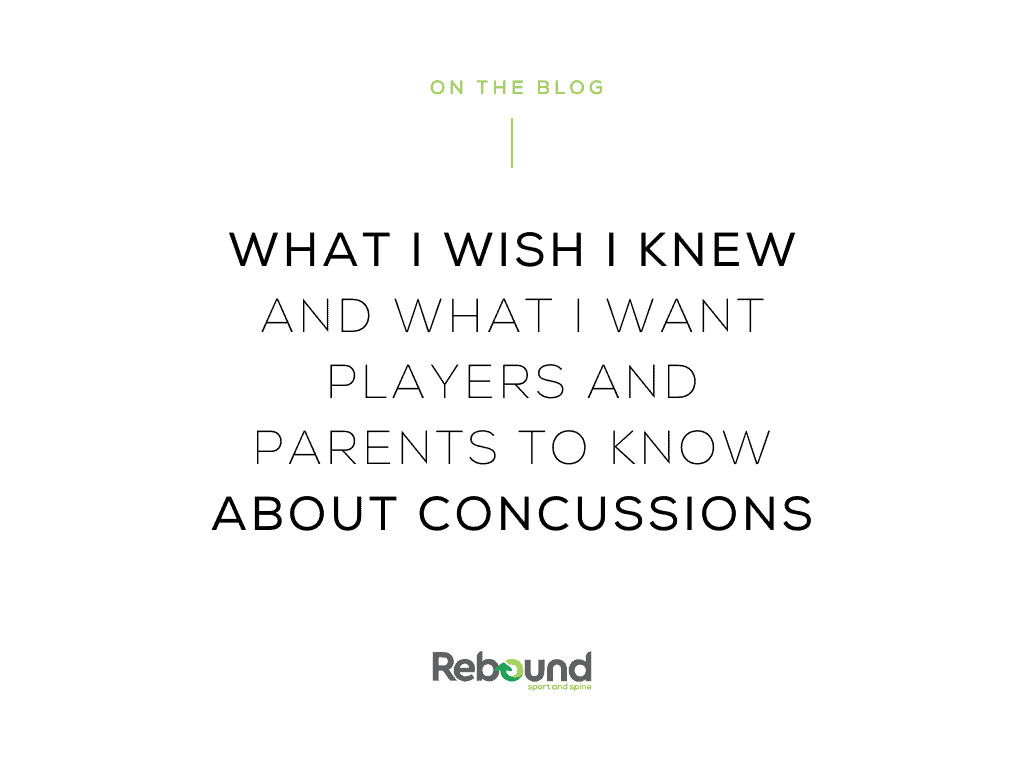What you should know about Concussions
Do you have the right information about concussions?
There are a lot of myths and misinformation around concussions. I see it on a weekly basis. I am contacted by a player or parent who has been assessed and provided with scant information about a suspected concussion, or more importantly, how to manage it.
Though a bit dated, in 2012, Burke et al. did a survey of all the med schools in Canada. They asked; “How much training in Concussion assessment and Management did Medical Schools cover.” The answer is shocking…NONE! Another study done by Zemek et al in 2014 found that only 30% of Doctors knew some management for return to sport (ie, some type of protocol). More recently I asked one of my former interns who is now in physiotherapy school how much training they receive in concussion. They suggested they receive about 3-5 hours of training in concussion. Is this enough to warrant proper assessment and management?

When I present to parents and players, I always ask; “Where is the first place you think to take you or your child to if you believe they have a concussion.” The number one answer, Hospital Emergency or Medical Doctor. My greatest concern about this is that suspected concussions are not getting a proper assessment and subsequently, they are not managed appropriately.
I have presented to numerous groups over the past 6 years of studying and running a concussion program (Complete Concussion Management Inc.) through my clinic at Rebound. One of the jokes that I tell during my presentation is; “If you or a player is knocked out, you don’t need to be a doctor to identify it as a concussion. These types of concussions are not hard to spot. The ones that are infinitely more difficult are the ones where a player is hit awkwardly and shows maybe some signs of concussion. Even as a Doctor who sees this happen in the field, I have a hard time identifying whether it is or is not a concussion. So if I, as someone who has extensive training and/or saw the mechanism of injury (ie. the “hit”), how can a parent/coaches with no training, or a healthcare practitioner with minimal to no training (and did not see the mechanism/hit) reliably assess and properly manage a suspected concussion?
One of the hardest parts about a concussion is there is currently no reliable assessment tool to accurately diagnose a concussion. This means you cannot see it on an MRI or CT scan, there are no blood tests, most neurological tests will show as negative (unless there is something seriously wrong). Most concussion symptoms are what we call subjective. Subjective symptoms are symptoms that the patient will experience, but there is no way of proving these symptoms. A headache is a good example of this. If you tell me you have a headache and I asked you to prove it to you, you could not! This is in contrast to Objective signs and symptoms. These are measurable such as a fever that can indicate some type of illness. A fever can be measured with a thermometer to prove that someone has a fever. This is why it is important that someone is assessed by a trained healthcare provider with experience in concussion as a vast majority of the “tests” will show up as negative.
The big takeaway from my presentation is this:
“I want you to think of concussions like a “light switch.” There are 2 choices for a light switch: ON and OFF. For a concussion, you either HAVE ONE, or you DO NOT HAVE ONE. There is no such thing as a “mild concussion” or a “severe concussion.” This can prove very difficult as there may be some mild symptoms that lead us to suspect a concussion. However, if we are unsure whether you have one or not, we will suspect that you do have one until it is ruled out or until you have recovered from your concussion”.
I am an advocate for further education in concussions for coaches, parents, players, and healthcare practitioners. One of the reasons is that I have suffered a concussion in my earlier years. I was not able to get proper assessment or management for my concussions and thus, suffered for longer than I should have. If you have questions about concussions, contact someone who is trained in concussion management.
To book a concussion appointment, you can contact the clinic at 778-771-3040.






